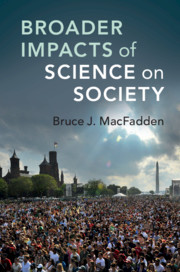Book contents
- Broader Impacts of Science on Society
- Reviews
- Broader Impacts of Science on Society
- Copyright page
- Contents
- Preface
- Abbreviations, Definitions, and Acronyms
- 1 Introduction: Science, STEM, and Society
- 2 NSF and Broader Impacts
- 3 Innovation, Opportunity, and Integration
- 4 Communication and Dissemination
- 5 Promoting Yourself and Optimizing Impact
- 6 Collaboration, Authorship, and Networks
- 7 Strategic versus Curiosity Science
- 8 Know Your Audience
- 9 Diversity, Equity, and Inclusion
- 10 Mentoring and Role Models
- 11 Formal K–12 Education and Partners
- 12 Higher Education
- 13 Informal STEM Learning in Museums and Beyond
- 14 Public Participation and Community (Citizen) Science
- 15 Computers and Cyberimpacts
- 16 Developing a Broader Impacts Plan
- 17 Project Management and Sustainability
- 18 Were You Successful? Evaluation and Metrics
- 19 Wrap-Up, the Future, and Broader Impacts 3.0
- References
- Index
6 - Collaboration, Authorship, and Networks
Published online by Cambridge University Press: 11 October 2019
- Broader Impacts of Science on Society
- Reviews
- Broader Impacts of Science on Society
- Copyright page
- Contents
- Preface
- Abbreviations, Definitions, and Acronyms
- 1 Introduction: Science, STEM, and Society
- 2 NSF and Broader Impacts
- 3 Innovation, Opportunity, and Integration
- 4 Communication and Dissemination
- 5 Promoting Yourself and Optimizing Impact
- 6 Collaboration, Authorship, and Networks
- 7 Strategic versus Curiosity Science
- 8 Know Your Audience
- 9 Diversity, Equity, and Inclusion
- 10 Mentoring and Role Models
- 11 Formal K–12 Education and Partners
- 12 Higher Education
- 13 Informal STEM Learning in Museums and Beyond
- 14 Public Participation and Community (Citizen) Science
- 15 Computers and Cyberimpacts
- 16 Developing a Broader Impacts Plan
- 17 Project Management and Sustainability
- 18 Were You Successful? Evaluation and Metrics
- 19 Wrap-Up, the Future, and Broader Impacts 3.0
- References
- Index
Summary
A fundamental part of the process of research is collaboration and networking. The rationale and benefits of working with others are manifold. In an increasingly integrative pursuit, which at the same time has seen a growth of individual specialization, collaboration promotes the pooling of resources and sharing of diverse expertise. Many breakthroughs can come from these integrative or multidisciplinary collaborations. From a human perspective, the process of research has a social component in which scientists collaborate and make meaningful friendships, but if not careful these can also result in unpleasant consequences. Nevertheless, during my more than 40 years of research, I have largely benefitted from rewarding collaborations as well as forming lasting friendships with colleagues.
- Type
- Chapter
- Information
- Broader Impacts of Science on Society , pp. 68 - 80Publisher: Cambridge University PressPrint publication year: 2019

